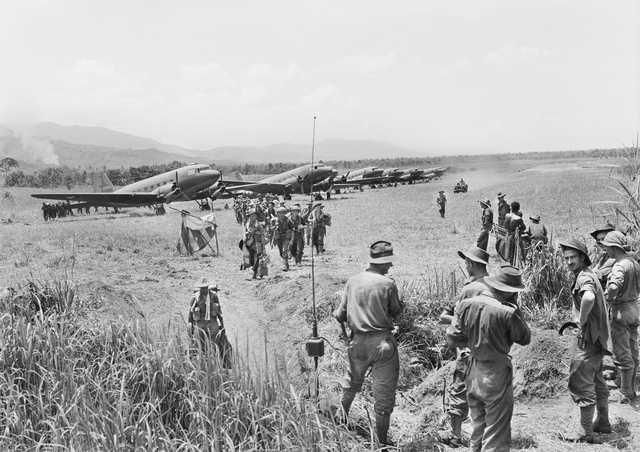The Battle of Kaiapit in the Markham and Ramu Valley – Finisterre Range Campaign was fought between the Japanese and Australian armies.
The battle saw the Australian 2/6th Independent Company flown into the Markham Valley by the United States Army Air Force, which then attacked the village the prior day. The village was reinforced by the Japanese, unbeknownst to the Australians, who then held out against strong counter-attacks against a more numerous foe, allowing the Australian 7th Division to be flown into the upper Markham Valley.
The entire Allied strategy in the battles provided an interesting example of the use of air power for transport, making the units types of airborne units, while neither paratroopers nor glider infantry were deployed. Insertion by C-47 is something that the US Army had experimented with prior to the US entering the war, briefly considering creating units that would fly in, and land, and then go into combat. This was abandoned before the war, but it's exactly what occured here.
American forces on Sagekarasa in the Solomons discover that the Japanese forces have evacuated the island. The Japanese were proving adept at withdrawing from locations undetected.
Sarah Sundin notes on her blog that the U.S. 5th Army and the British 8th Army linked in Italy on this day.
General Marshal and Admiral King testify in front of a Senate Committee that failing to conscript fathers of families stood to prolong the war.
Germany began the mass deportation of Belgian Jews to Auschwitz.
The Germans demanded that Italy's gold reserves be placed in German custody in Milan.
Crew of the midget submarine X-5. All were killed by counter fire from the Tirpitz during the raid when their vessel was hit and sank.
Six Commonwealth midget submarines, of which five were lost, raided the German Kriegsmarine in Norway, damaging the Tirpitz. The raid, Operation Source, was heroic, but of debatable utility given the heavy loss of life.
The crews were made up of members of the Australian, New Zealand and British navies.
The first flight of the De Havilland Vampire took place.
The fighters were ordered into production in 1944 with the first deliveries coming in April 1945, too late to be used during it. It would go on to be a successful post-war British fighter, but was already obsolete by the early 1950s.
Sarah Sundin notes that the U.S. stood down its coast observation posts, the threat of invasion having ceased.
USS Liscome Bay (CVE-56), September 20, 1943.


.jpg)

No comments:
Post a Comment